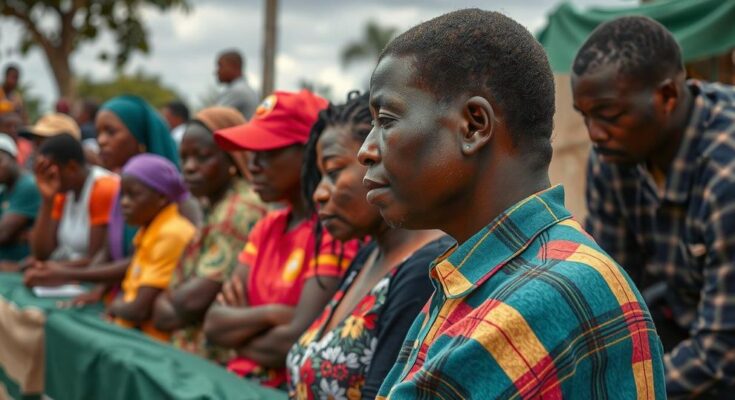Mozambique faces mourning after nearly 280 deaths in two months of political unrest linked to a disputed election. Tragic accounts of families reveal the devastating impact of violence, reportedly initiated by security forces against protesters. While the unrest has quieted, political tensions remain as the opposition continues to contest the election outcomes, highlighting ongoing struggles for justice and accountability.
Mozambique is currently in mourning following the tragic loss of nearly 280 lives over a two-month span of unrest initiated by a contentious election. Among those lost is a 16-year-old girl shot on Christmas Day and a 22-year-old man, both fatalities attributed to security forces amidst widespread protests spurred by the announced election results favoring Daniel Chapo of the ruling Frelimo party. The protests, largely led by opposition supporters, witnessed security forces utilizing live ammunition, raising significant concerns among human rights organizations regarding the conduct of authorities during civil unrest. The fatalities recount the anguish of families who have lost loved ones in this turmoil, highlighting the harrowing impact of political strife on communities.
The conflict erupted following the October 24 elections, where the announcement of Chapo as the victor incited protests against perceived electoral malfeasance. Rights advocates report that young individuals have predominantly borne the brunt of the violence, leading to unnecessary casualties among innocent bystanders. The accounts of victims’ families reveal not only personal tragedies but also a profound disillusionment with governmental accountability as investigations into the incidents remain hampered by a lack of proper documentation and public trust in the state’s protective measures. As the political situation continues to unfold, the fear of further instability looms in the backdrop of Mozambican society.
Amidst this backdrop, one mother mourns her daughter, Yolanda Jose Luis, who was inadvertently caught in gunfire while en route to a family gathering. Her brother recounted the tragic moment: “The police followed the minibus and when it reached a curve, they opened fire. It was at that moment that my sister was hit.” Another victim, Silvio Jose Jeremias, had been enjoying an outing with friends when he was shot by alleged plain-clothes officers, leaving a desperate plea from his mother who witnessed his final moments. Families and communities are left grappling with the aftermath of lost lives and unanswered questions while struggling to pursue justice in an environment that appears to favor state impunity.
While the unrest has subsided since Christmas, the political impasse remains, with Chapo expected to assume the presidency by mid-January. Meanwhile, opposition leader Venancio Mondlane, currently in exile, continues to contest the electoral integrity, signaling that the struggle for justice and transparency is far from over. The unfolding situation in Mozambique raises critical discussions around government accountability and the rights of citizens amidst political dissent.
The recent election disturbances in Mozambique have incited significant civil unrest, leading to the deaths of almost 280 individuals. This violence stems from deep-seated frustrations surrounding the electoral process, primarily fueled by claims of fraudulent practices by the ruling Frelimo party, which has remained in power for fifty years. Various rights organizations have condemned the actions of security forces, who have reportedly used excessive force during protests. The ongoing struggle for justice underscores the challenges faced by citizens in holding authorities accountable in a climate of political turbulence.
In conclusion, the situation in Mozambique serves as a stark reminder of the human cost associated with political unrest. The deaths of innocent individuals during the recent protests reflect a broader issue of governmental accountability and the protection of citizen rights. As Mozambique grapples with its political identity, the calls for justice and truth persist, advocating for necessary reforms that honor the lives lost amidst this turmoil.
Original Source: www.barrons.com




